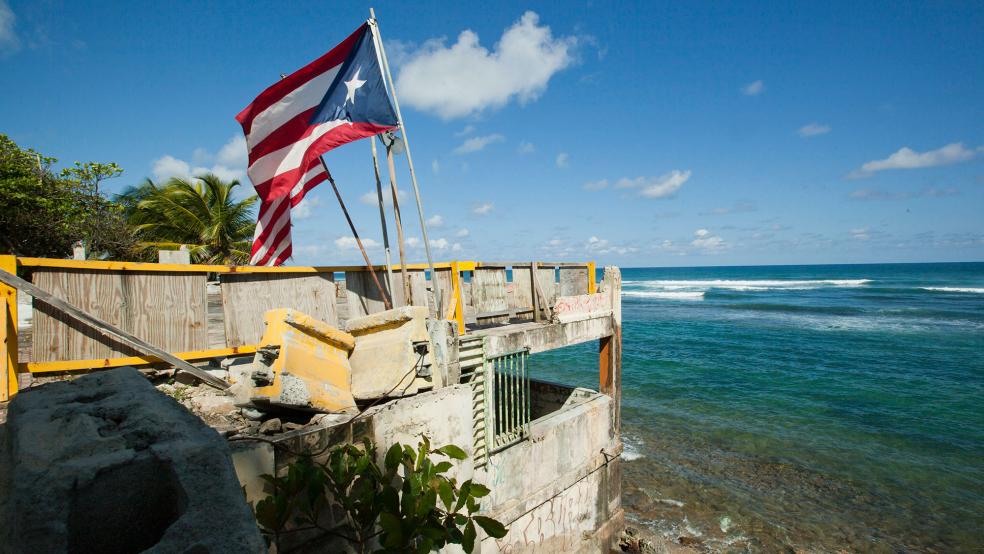The White House and House Republicans have finally reached a deal to help Puerto Rico dig out from $70 billion in debt, but the bipartisan agreement has quickly become another point of contention in the not-quite-over Democratic presidential primary.
Hillary Clinton, despite what she called “serious concerns over several provisions” in the legislation, says the bill should move forward. “Otherwise, without any means of addressing this crisis, too many Puerto Ricans will continue to suffer,” she said in a statement Friday.
That same day, Bernie Sanders slammed the House bill, which combines federal oversight with a legal process for writing down Puerto Rico’s debt. “We must never give an unelected control board the power to balance Puerto Rico's budget on the backs of children, senior citizens, the sick and the most vulnerable people in Puerto Rico while giving the people of Puerto Rico absolutely no say at all in the process,” he said in a statement.
Related: Puerto Rico’s Fiscal Crisis Has Been Brewing for 75 Years
By drawing a sharp distinction with the White House and the Clinton campaign, Sanders hopes he can remain relevant through Puerto Rico’s June 5 primary and beyond, at a time when Clinton needs to pivot to the general election.
So which is better – the House bill or Sanders’ alternative?
One distinct part of Sanders’ approach is his call for Federal Reserve to offer Puerto Rico emergency financing. In this regard, Sanders aptly reminds us that the Fed provided trillions of dollars in emergency loans to financial institutions and corporations during and after the Great Recession. As data obtained by Bloomberg show, the Central Bank also assisted a number of foreign governments and its loans to just one company, Morgan Stanley, peaked at $107 billion — dwarfing Puerto Rico’s outstanding debt. So if Morgan Stanley merits a bailout why not Puerto Rico?
Related: Why Hedge Funds May Not Get a Windfall from Puerto Rico
The Fed’s power to make these loans is outlined in Section 13(3) of the Federal Reserve Act. Unfortunately, the Act as written may not be applicable to Puerto Rico. It authorizes loans to “individuals, partnerships and corporations,” potentially excluding the Commonwealth government. It also prohibits loans to insolvent entities, which may make Puerto Rico’s Electric Power Authority and Government Development Bank ineligible.
Further, loans under 13(3) are supposed to be short term in nature. This is also true of Section 14(2) of the Federal Reserve Act, which allows lending to foreign governments and U.S. municipalities for a term no greater than six months. Given the magnitude of Puerto Rico’s problems, it will be a lot more than six months before it can return to the capital markets, so this Fed authority does not seem like a perfect fit.
Maybe the law should be changed. As the Roosevelt Institute’s Saqib Bhatti argues, an extension of this six-month limit could allow the Fed to actively participate in the U.S. municipal market — enabling states and cities to borrow at much lower interest rates and without origination fees. While this idea has a lot of merit, it requires legislation unlikely to emerge from a Republican Congress. The Fed could get around the six-month limit in Puerto Rico’s case by buying short-term bonds from public entities on the island and then rolling them over every few months until private funding becomes available.
Related: Everything You Need to Know About the Puerto Rico Debt Crisis
Sanders suggestion of a Federal Reserve role is worth considering, but other aspects of his program are problematic. Calling for investors to take “a massive haircut,” Sanders proposes an independent audit of Puerto Rico’s debt with an eye toward repudiating any of it found to be unconstitutional.
This position is dangerous for the health of the municipal bond market and thus the ability of states and local governments to borrow at reasonable costs. If the response to a government’s financial difficulties is a search for irregularities in its bond documents with the goal of setting aside as many as possible, investors will shy away from the market and issuers will be obliged to pay extra for more rounds of due diligence.
Sanders also opposes the federal oversight board proposed under the House bill and austerity measures such as school closures. Puerto Rico’s under-18 population fell from nearly 1.1 million in 2000 to 903,000 in 2010 and to an estimated 773,000 in 2014. Under the circumstances, it does not make sense to continue operating the same number of schools.
Related: Could Puerto Rico Be Saved by Becoming the 51st State?
Given the decline in Puerto Rico’s population, all government services should be adjusted to remain in sync, but this “right-sizing” of public facilities is not occurring. For example, Puerto Rico continues to operate 36 correctional facilities despite a fall in the number of inmates and significant overcapacity.
Because reducing the scope of government facilities can be politically challenging, elected officials sometimes realize that they need to delegate the job to unelected teams of experts. A successful example of this technique was the Base Realignment and Closure Commission appointed at the end of the Cold War. Congressional leaders recognized that the nation required fewer bases, but that individual representatives would resist closures in their districts. Consequently, they established an unelected commission to choose bases to close free of political pressure.
Unelected fiscal commissions have worked in such diverse places as Newfoundland, New York City and Washington, D.C. In the D.C. case, Mayor Marion Barry, whose power was limited by a congressionally imposed control board, came to see the benefits. In 2011, he told The Washington Post that the board "was able to do some things that needed to be done that, politically, I would not do.”
Sanders also dislikes language in the House bill that would allow Puerto Rico’s governor to implement a lower minimum wage — $4.25 per hour — for workers between 20 and 25 years old. According to International Labour Organization statistics, youth unemployment in Puerto Rico was 25.9 percent in 2015 — more than double the rate in the 50 states. Given this lack of jobs, something needs to be done to create more opportunity for young people who want to stay in Puerto Rico. Sanders’s alternative — a massive government jobs program — is not possible with this Congress.
Related: Here’s What Happens If Sanders Drops Out of the Race
Sanders and his supporters may hope that the next Congress will be better, but it is extremely unlikely that Democrats can flip the 30 House seats needed to take control. So even if Democrats pick up the Senate and win the White House, they will still be working with Speaker Paul Ryan.
Like all legislation in the real world, the new House bill isn’t perfect. But it is the only game in town. The only alternative — waiting for a Progressive Congress — is not just unrealistic, but it is also unfair to the people of Puerto Rico, who need the debt relief and fiscal stability that this bill can provide.






